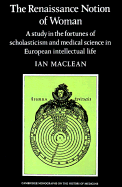 The Renaissance Notion of Woman
The Renaissance Notion of Woman Summary
6.1.1 Why do certain aspects of the notion of woman not change, while others undergo modification during the Renaissance? What are the main differences in the notion of woman which take place during this period? Is there a Renaissance ‘feminist’ movement (that is, a movement to improve the notional status of woman vis-à-vis man), and in what does it consist? The answers offered to these questions are necessarily tentative, as they relate to a study of fragmentary evidence culled from texts widely separated in date and place of publication. They are also offered in the awareness that the notion of woman has a wider context than that which has been considered here, and that it is affected by changes to the notion of ‘human being’ and ‘male’ which merit further investigation.
6.1.2 The main causes for stasis in the notion of woman which emerge from this study are, in different contexts, the desire to foster and preserve the scholastic synthesis, and the influence on thought of the institution of matrimony. The first of these causes is apparent in the interdisciplinary and recuperative features of theological, medical, moral and legal texts, and in the transmission of information between disciplines in the form of commonplaces. For a synthesis to be effective, it must embrace the whole encyclopaedia of knowledge, and must account for all known evidence, using a method adaptable to each individual discipline.
- Type
- Chapter
- Information
- The Renaissance Notion of WomanA Study in the Fortunes of Scholasticism and Medical Science in European Intellectual Life, pp. 82 - 92Publisher: Cambridge University PressPrint publication year: 1980


